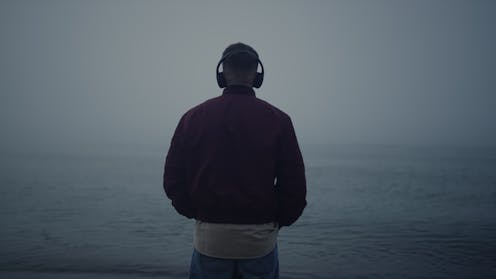
Deep in your memory, your brain has created a playlist of music from your teenage years. Even though life has moved on, hearing that music now likely still brings up some really powerful emotions.
Why?
Well, as with anything to do with the brain and with emotions, it’s hard to say for sure. But it’s likely a bit to do with evolution, and a bit to do with some key neurological changes that occur in the teenage years.
Imagine the world of a prehistoric teenager
Changing hormones supercharge the limbic system, which is the emotional centre of the brain. Teens become emotionally sensitive and susceptible to intense mood swings.
At the same time, we start to become less reliant on our parents.
This increasing independence accelerates the need to forge close relationships with peers. We need to learn very quickly how to interpret the emotions of others, and develop strong memories of things that are safe or unsafe.
Imagine the world of a prehistoric teenager. No longer a child wholly dependent on their parents, the adolescent feels an instinctive drive to explore new territory and strike out on their own.
Away from their family’s protection, survival now hinges on bonds with peers.
Going it alone is fraught with danger. Belonging to a group becomes a matter of life or death.
The teen finds a new pack, which communicates crucial information to each other using body language or non-linguistic verbalisations. Variations in the voice pitch or the speed of speech signal urgency or excitement.
Strong emotional reactions – the fear of danger, the thrill of a successful hunt, an intense connection with a potential mate – ensure memories about what to fear and what to seek are deeply carved into this teenage brain.
The stronger the emotion, the deeper the memory.
The brains of modern teens aren’t much different
In today’s world, we seldom need to hunt for food or protect ourselves from predators trying to eat us. But modern teenage brains are still wired to react quickly and instinctively.
Modern teens will still strike out away from the safety of the family circle, learning to navigate the treacherous world of adolescent relationships.
As we all know – often from searingly painful personal experience – teenage brains are keenly attuned to non-linguistic social cues that signal acceptance or rejection by the pack.
We are evolutionarily wired to lay down deep memories in our brains of events that have had a strong emotional impact on us.

So what’s this got to do with teen music tastes?
Music can convey linguistic and non-linguistic emotion.
Lyrics can tell a story that makes us feel heard and understood. They might signal we belong and are connected – with the artist, with other fans, and with broader human experiences such as love, lust or loneliness.
The melody and beat communicate emotion too.
In fact, some scholars believe the very reason music exists is related to the non-linguistic elements of speech that our prehistoric ancestors may have used to communicate before spoken language developed.
Our brains may respond to these signals in music the way our prehistoric ancestors responded to expressions of urgency, excitement or peace from other members of the tribe.
The way music communicates and evokes emotion is what makes it so important in life, particularly during the teenage years.
Teenagers may spend several hours per day listening to music, particularly when going through periods of psychological distress.
During this period – when emotional experiences and the learning that comes from them are so crucial to learning to survive – music becomes a powerful tool.
It can act as a simulator for practising emotional skills, a guide to navigating emotional ups and downs and a key to finding connection and belonging.
In other words, the music that we hear in our teenage years becomes closely intertwined with the strong emotions we experience at that time.

A time of many firsts
The music of your teens was likely the backdrop to your first kiss, the anthem you sang along to with friends, and a source of comfort when your heart was first broken.
Evolution has programmed you to feel every moment of your teenage years profoundly, so you can learn important lessons about how to survive, become independent and connect with others.
At the same time, music may be tapping into an ancient, pre-language part of our brains.
The music that accompanied high-stakes moments of your youth is forever linked to the powerful emotions you experienced then, and deeply embedded in the brain.
That is why, for the rest of our lives, those songs act as a kind of musical key to a neurological time capsule.
Sandra Garrido does not work for, consult, own shares in or receive funding from any company or organisation that would benefit from this article, and has disclosed no relevant affiliations beyond their academic appointment.
This article was originally published on The Conversation. Read the original article.







